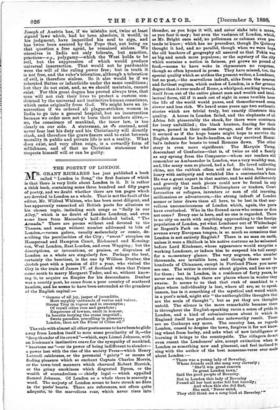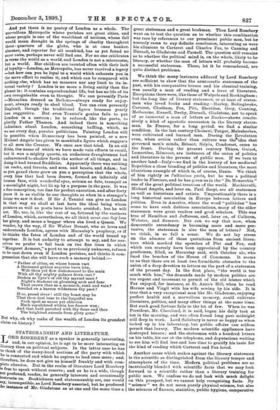THE POETRY OF LONDON.
GRANT RICHARDS has just published a book called " London in Song," the first feature of which is that there is very little about London in it. It is rather a thick book, containing some three hundred and fifty pages of poetry, and we doubt whether there are ten pages which
are devoted to London as a whole. That is not the fault of the editor, Mr. Wilfred Whitten, who has been most diligent, and has apparently ransacked all British poets for allusions to his chosen topic, including such songs as "Sally in our Alley," which is no doubt of London Londony, and even some lines from Macaulay's half - finished ballad, " The Armada." There are poems without end devoted to the Thames, and songs without number addressed to bits of London,—verses galore, usually melancholy or comic, de- scribing the peculiarities of the City ; "sweet" strophes on Hampstead and Hampton Court, Richmond and Kensing- ton, West London, East London, and even Wapping ; but the
descriptions, or invocations, or praises, or dispraises of London as a whole are singularly few. Perhaps the best, certainly the heartiest, is the one by William Danbar, the scotch poet with a pension of £10 a year, who visited the City in the train of James IV. of Scotland when that Prince 'came south to marry Margaret Tudor, and so, without know-
ing it, to acquire an Empire for his descendants. Dunbar was a courtly poet, he came from a poor country of scattered hamlets, and he seems to have been astounded at the grandeur of the English capital:—
" Gemme of all joy, jasper of jocunditie,
Most myghty carbuncle of vertue and valour, Strong Troy in vigour and in strenuytie ; Of royall cities rose and geraflonr ; Emperesse of townes, exalt in honour, In beautie berying the crone imperiall ; Swete paradise, precelling in pleasure ; London, thou art the Flour of Cities all."
The rule with almost all other poets seems to have been to glide away from London itself to note some peculiarity of it,—the
"deep thunder of its crowd"—which, says Lionel Johnson, with an Irishman's instinctive crave for the sympathy of mankind, " heartens me "—or its power of being indifferent to slander— a power lost with the rise of the society Press—which Henry Luttrell celebrates, or the perennial " gaiety " or means of finding pleasure which so enchant Captain Charles Morris, or the town-bred manners which charmed Robert Herrick,
or the grimy smokiness which disgusted Byron, or the wealth of econndrelism — chiefly legal — which appalled Samuel Johnson. Of London as a whole there is scarcely a word. The majesty of London seems to have struck no fibre in the poets' hearts. There are references, not often quite
adequate, to the marvellous roar, which never rises into
thunder, as you hope it will, and never sinks into a moan, as you fear it may; but even the vastness of London, which, as Mr. Bright once said, no policeman or cabman even pre. tends to know ; which has no precedent, though De Quince}, thought it had, and no parallel, though when we were bey; the old teachers of geography all assured us that Pekin was as big and much more populous ; or the mystery of the city which sustains a nation in fatness, yet grows no pound of food,—seems to have woke in rhymesters no response, though so often hymned in prose. They have missed, too, the special quality which so strikes the present writer, a Londoner, but no poet,—the marvellous indraft, alike from the nearest and farthest regions, which makes of London, in a far greater degree than it ever made of Rome, a whirlpool, sucking towards itself from out of the entire planet men and wealth and Intel. lectual force, till if it sank out of sight in some terrible hour the life of the world would pause, and thenceforward seem slower and less rich. We heard some years ago two authentic
stories which are trivial truly, but exactly illustrate this quality. A house in London failed, and the elephants of all Africa felt pleasurably the shock, for there were contracts for ivory unfulfilled ; the black hunters, fearing for their wages, paused in their endless ravage, and for six months it seemed as if the huge beasts might hope to survive the English demand for knife-handles, as they survived Hanni- bal's indents for beasts to tread Romans down. The other story is even more significant. The Marquis Tseng, descendant of Confucius—that is, of twice as old a family as any sprung from the Conqueror—whom our readers will remember as Ambassador in London, was a very wealthy man, and, like many men so placed, had a fad. He loved collecting china, not the rubbish often sold as fine china, but pieces hoary with antiquity and wrinkled like a centenarian's face.
He was a great expert in that matter, and he said deliberately and gravely that such pieces could now be found in any quantity only in London ! Philosophers or traders, Court
favourites or refugees, inventors or men of old learning, millionaires or adventurers,—the strong indraft of London sooner or later draws them all here, to be lost in that mar- vellous unconsciousness of London which, again, the poets have overlooked. Who in the Strand cares who comes or does
not come ? Every one is here, and no one is regarded. There is no city on earth with anything approaching to the foreign population of London, yet what Londoner out of Whitechapel or Regent's Park on Sunday, where you hear under one avenue every European tongue, is so much as conscious that
London is not entirely English ? There is no man on earth, unless it were a Shillook in his native costume as he salaamed before Lord Kitchener, whose appearance would surprise a
working Londoner, or induce him to suspend his toil except for a momentary glance. The very negroes, who number thousands, are invisible here, and though there must be
hundreds of Chinamen, except in Portland Place you never see one. The writer is curious about gipsies, and has an eye for them ; but in London, in a residence of forty years, he never saw one, though there are places where in winter they swarm. It seems to us that that rneh of mankind to a place where individuality is lost, where all are, so to speak, unseen, has in it something of the mystical and weird which,
in a poet's mind, might stir "the unthoughtlike thoughts that are the souls of thought "; but as yet they are thoughts untold. The silence is the more remarkable because there is throughout the English-speaking races a sense of pride in London, and a kind of submissiveness about it which in England itself has produced one noteworthy result. There are no Cockneys any more. The country has, as regards London, ceased to despise the town, forgives it for not know- ing wheat from barley, and asks what of new intelligence or learning it brings to the countryside. The villagers do not even resent the Londoners' airs, accept extinction when in London as something new and pleasant, and feel inclined to sing with the author of the best nonsense-verse ever made about London :—
" There was a young lady of Beverley, Whose friends said she sang very cleverly ; She'll win great renown In great London town,' Said the good people of Beverley.
But in London this lady of Beverley Found all her best notes fell but heavily; And when this she did find, She said, 'Never mind,
They still think me a song-bird at Beverley." And yet there is no poetry of London as a whole. The marvellous Metropolis whose parishes are great cities, and whose people is one of the wealthiest of nations, whose fall would mean drought in the springs of charity throughout three - quarters of the globe, who is at once banker, Almoner, and reporter for all mankind, has as yet found no Neer vales, perhaps never will find one. For no one celebrates
in verse the world as a world, and London is not a microcosm, but a world. Her children are taunted often with their lack of loyalty—London, as Metropolis, has never received a legacy --but how can you be loyal to a world which exhausts you in the mere effort to realise it, and which can be compared with
nothing else, which has no measure nor any limit to its in- ternal variety ? London is no more a living entity than the planet is; it contains superabundant life, but has no life of its own recognisable even to thought. We can personify Paris
—Messaiina dressed as Bellona—always ready for enjoy- ment, always ready to shed blood. You can even personify England, though the traditional figure becomes yearly less suggestive. But even Tenniel's genius fails to put London in a cartoon ; he is reduced, like the poets, to glorify Father Thames. And indeed there is something indistinct aboul London, something baffling, which, as we see every day, puzzles politicians. Painting London will be possible when Democracy has been painted, or a new Michael Angelo has given to mankind a figure which suggests to all men the Creator. We once saw that tried. In an old Bible, the name of which we have made vain efforts to recall, but it was a mighty quarto, an audacious draughtsman had endeavoured to shadow forth the author of all things, and in doing it bad turned Buddhist. Apparently there was nothing but rocks, and forests, and seas, and beasts, and Adam ; but as you gazed there grew on you a perception that the whole, every line that had been drawn, formed an infinitely old human face, with wonderful eyes, solemn as fate, tranquil as a moonlight night, but lit up by a purpose in the gaze. It was a fine conception, too fine for perfect execution, and after forty years it is as visible to our thoughts as when in a stranger's bowie we saw it first. If Sir J. Tenniel can give us London in that way we shall at last have the ideal being whom painters as well as poets have hitherto avoided ; but he will
not. He, too, is, like the rest of us, fettered by the vastness of London, which, nevertheless, we all think must one day lose her glory, and moan a beggar where she lived a Queen. We wonder, by the way, if Sir Walter Besant, who so loves and understands London, agrees with Macaulay's prophecy, or if
he thinks the fates of London and of the world bound up together. It is but audacity to attempt to say, and for our- selves we prefer to fall back on the fine lines in which "Margaret Armour," a poet to us previously unknown, refuses to be cast down even if London perishes, and thinks it com- pensation that she will leave such a memory behind :—
" Father of cities, on whose bosom vast A thousand golden argosies have lain, Wilt thou yet flow dishonoured to the main With all thy mighty palaces down cast ? Broken as Tyre's of old thy myriad mast ?
Night's diadems on gleaming arch and fane That crown thee as a monarch, sunk and vain ? Scrolled on a barren wilderness thy past?
If so, proud river ! still thy boast may be That thou dost bear to the forgetful sea Such spoil as never yet oblivion !lath sepulchred within her furrow wan; And that hath perished with thy fame and thee The brightest aureole from glory gone."
But why, oh why make of the wealth of London its grandest claim on history ?























































 Previous page
Previous page